- Home
- Hugo Hamilton
The Sailor in the Wardrobe
The Sailor in the Wardrobe Read online
HUGO HAMILTON
The Sailor in the Wardrobe
For Máire
Special thanks to Petra Eggers, Nina Härte,
Rainer Milzkott, and also to Arcadia in Potsdam
Die Zerrissenheit ist unsere Identität.
Disconnectedness is our identity.
Hans Magnus Enzensberger
Table of Contents
Title Page
Dedication
Epigraph
One
Two
Three
Four
Five
Six
Seven
Eight
Nine
Ten
Eleven
Twelve
Thirteen
Fourteen
Fifteen
Sixteen
Seventeen
Eighteen
Nineteen
Twenty
Twenty-one
Twenty-two
About the Author
Praise
Also the Author
Copyright
About the Publisher
One
People say you’re born innocent, but it’s not true. You inherit all kinds of things that you can do nothing about. You inherit your identity, your history, like a birthmark that you can’t wash off. We have our Irish history and our German history, like an original sin. We are born with our heads turned back, but my mother says we have to face into the future now. You have to earn your own innocence, she says. You have to grow up and become innocent.
The front door of our house is wide open. She has opened all the windows as well, to let in the air. There is no wind, only the long net curtains in the front room floating a little and the hum of summer all around the house. The floor has been polished and we have the solstice shining along the hallway. Once, my father brought us up to Newgrange in the car and told us about the winter solstice, how the sun reaches right into the megalithic tomb at Christmas and lights up the inner chamber. He says it’s like a piece of knowledge entering into the mind. Now we have the first summer solstice shining through our house, lighting up the shadowed places. For a few moments, the sun is reflected against one of the top windows on the red-bricked terrace across the road and beams right in through the hallway. It bounces off the wooden floor and off the carved oak trunk and shines right through into the kitchen at the back. It doesn’t last long, but while it does, there is a glint on every door handle, on vases, on picture frames, so bright that it makes you almost blind. All you can see is the white shape of the door frame and the fanlight.
On the roof of the breakfast room, my father is looking after the bees. I go outside to help him and watch him stepping carefully around the hives. We’re like two astronauts out there, standing on top of a strange planet with square bee-keeping cages around our heads, working in silence. He signals to me with his big glove and I hand him the smoker, and then the stainless steel lever so he can lift out the frames to make sure the bees are not thinking of swarming. The bees don’t like to be exposed to the light. They cling to the frames like a moving beard, listening to the restless thoughts in his mind. I can hear their tiny voices in thousands, like one strong, fizzing growl, as if they’re already planning to kill him. For the moment there is a truce, and we close up the hives again. We put away the bee-keeping gear and he tells me to come down into the front room.
‘There’s something I want you to know,’ he says.
He closes the door. The atmosphere is solemn. My mother is already sitting down, waiting.
‘I think you’re old enough to hear this,’ he says. He wants me to know what happened when the war was over and my mother was trying to get home. I have been chosen to receive this message from the past, a story about the British, one that we have to sit down for.
My mother talks about the phosphor bombs that rained down on the cities and about the final defeat, about the last shot being fired and the time of liberation, when everybody was finally on their way home. She remembers the feeling of freedom that was in the air that summer, like the smell of grass. She had to make her way back from Czechoslovakia where everybody was still running away from the Russians. She was on a German army truck with the Russian tanks no more than half a kilometre behind, cutting across the fields to try and head them off. In the end she got away only because of the mud everywhere and the roads so full of people that the Russians couldn’t catch them. At the border, the German soldiers changed out of their uniforms and became civilians again. She remembers seeing a mound of helmets and guns lying beside the road. She was lucky because she cycled through the Fichtel mountains with an officer who had secretly decided to hold on to his gun and then saved her life. All the way down to Nuremberg they had to take the highest roads by day and hide in the forests by night. It was the start of a beautiful hot summer, she says, but the officer was already married, so they had to say goodbye to each other and she continued on her way home, getting a lift with the American soldiers back towards the Rhineland.
Then we come to the part of the story that my father is waiting for. He has a frown on his forehead and his lips are pushed forward, listening to every word. My mother explains how, at the British checkpoint, she was brought into a compound where everybody was being processed. The men were separated from the women. She had to show her papers and answer questions about where she had been and what she had done with her life. The men were taken away and the officer in charge ordered all the women to line up outside. Around sixty to eighty women in all, my mother says, young and old, standing in a line while the officer walked up and down with a clipboard under his arm that had all their names on it. With the strong sunlight in their eyes, they could hardly see much more of him than the black outline of his uniform. There were trucks going past and a smell of diesel and dust in the air. There was an airfield somewhere close by too, because they could hear planes landing and taking off in the distance.
The officer then ordered them to undress down to the waist. An interpreter shouted out the order, but most of them understood the words in English. It didn’t look like a medical examination and the women looked around at each other, afraid of what was going to happen next. They obeyed and stood semi-naked with the trucks going by and the soldiers staring at them, whistling from up high as they passed. Some of the soldiers shouted things out, but their accents were hard to understand, even when they used German words like ‘Fräulein’.
My mother refused to undress. She had not always obeyed Hitler either. The officer soon came over and began to shout at her. He had a red face and maybe he was too hot inside his uniform, because he began tapping his clipboard against his leg until one of the women told her not to make so much of a fuss or she would get them all into trouble.
I don’t like hearing this story because it gives me the hurt mind. My mother undressed to the waist like the others, but as soon as the officer turned away, she pulled her dress back up again. The officer was angry that she would not surrender like everyone else. He marched straight over and pulled her dress down with his hand. The soldiers on the trucks waiting to leave the compound let out a big cheer. She could not see them against the sunlight, but she could smell their cigarette smoke. When the officer moved on again, she pulled her dress up to stop them staring and making remarks about German women. But he returned and ripped her dress down once more, shouting into her face in English, with the men on the trucks giving another big cheer. She had to give in finally because the women beside her told her it wasn’t worth it, the Germans had lost the war and the British had won.
‘Just let them see how beautiful we are,’ one of the women remarked.
Then my mother starts l
aughing. She says it was a German joke, because the woman who said it was very old, with wrinkled skin and not much for men to look at. She remembers how they all started laughing, even though most of them were ashamed and hungry and weak from walking, worried about what would happen next. They were worried about getting home, worried about what was left after the bombing and who was still alive, and even though they laughed quietly with their shoulders as if they had nothing more to lose, the real joke was on the German women now, standing half-naked in the sun with the whistles echoing in their ears as the trucks came and went. They had to suffer the humiliation of being defeated women, standing for ages in the burning heat with their hands down by their sides until some of the women began to faint and they all got a very nice sunburn before being let go, she says.
My father stands up and goes over to put his arm around her shoulder. I can hear his voice shaking as he speaks.
‘They shamed her,’ he says.
My mother is smiling now, trying to say that she’s lucky to be alive and it could have been much worse, like what happened to women in the east who were killed by the Germans, women who had all their dignity taken away from them, women who went to their death along with their children. Women who sang songs to their children at the last minute to make them less worried before they died in the concentration camps.
‘The Germans shamed themselves,’ she says. ‘Don’t forget that.’
But my father will not let it go. He is angry and sad at the same time. I can see his chin quivering. He speaks as if my mother has become part of Irish history now. He admires her for refusing to undress for the British and says she has the rebel heart. He wishes he could have been there to defend her, but it’s too late and too long ago and there’s nothing he can do about it any more except not to allow anything British under his roof. All he can do is stop English words coming into our house and drive everything British out of Ireland. He is still trying to protect her from this humiliation and wants me to remember that my mother’s family had been against the Nazis all along. Her uncle lost his job as Lord Mayor for not joining the party. Her sister Marianne turned her guest house in Salzburg into a safe haven during the war, hiding a Jewish woman who went around dressed as a Catholic nun. My mother disobeyed orders so that she could bring food to Salzburg and was arrested as a deserter, then sent to the east in a locked train carriage with a young boy soldier who was chained to the seat.
‘The British have no right to pass judgment on anyone,’ he says. There are other things to remember as well, things to do with Irish history, things that are still going on in Northern Ireland. He takes my mother’s hand. He has tears in his eyes and he can hardly speak any more.
‘They should look into their own hearts,’ he says.
My mother smiles and says it’s time to walk away from the hurt. It’s the time of forgiveness and peace. It’s time to imagine the dead people back to life again in our memory. It’s time to grow up and become innocent.
‘We just want to give you a conscience,’ she says finally.
After that the room is silent for a long time. My father takes off his glasses and wipes his eyes with the upper part of his wrist. It’s hard to look at them, sitting together side by side, unable to get away from the past. Maybe that’s why people have to pass things on to their children, so they can be freed from it themselves. I feel the weight of all this information in my chest because it’s the story of my mother being shamed. It’s like a blinding solstice entering into my head. I am the boy who was born with his head turned back and I can’t stop thinking of my mother, standing in the glare of the sunlight after the war, with nothing to say. I am the son of a German woman who was shamed in front of the world, and the son of an Irishman who is refusing to surrender to the British.
These are things I need to forget, things I don’t want to think about any more. I want to have no past behind me, no conscience and no memory. I want to get away from my home and my family and my history.
When I’m finally allowed to leave, I walk out the front door into the sunshine. I take my bike and feel the breeze coming in from the sea on my way down to the harbour. I pass by men in overalls painting the blue railings along the seafront. I hear them talking to each other, banging and scraping off the rust. I smell the paint and the cigarettes they smoke, like a new colour in the air. At the harbour, my friend Packer has got me a job working with an old fisherman. Nobody asks where I come from. It’s just me and Packer and the other lads working for Dan Turley, sitting on the trellis outside his shed on the pier, listening to the faraway sound of the radio and laughing at our own jokes. Dan Turley lying on his bunk inside the shed with his white cap right down over his eyes and us sitting outside in the sun with the painted signs behind us. Big white lettering on a blue background saying: fresh mackerel, lobster for sale, boats for hire, trips around the island.
People come from all over the place to buy fish and lobster. Some people hire out the boats to go fishing and others go for the pleasure trip. When they come back in, we have to tie up the boat, calculate how many hours they’ve been out, take the money and enter it into the book with the stub of a pencil on a string. All the boats have different names, like Sarah Jane and Printemps. Sometimes we have to go up on the rocks at the back of the shed with the binoculars, to make sure none of the boats are in difficulty. Sometimes we have to go out to rescue them when the engine fails. Couples going out to the island to lie around on the grass. Groups of them going out thinking it’s warm and only realizing when they get out there how breezy it can be. Then you see one of the women coming back shivering, wrapped up in a man’s jacket, maybe even pale and seasick because they’re not used to being out on the water. Sometimes it’s the opposite, when they go out in raincoats and come back all pink and sunburned down one side with half a red face. Sometimes you look out and it’s raining in one part of the bay while the sun is still shining straight down in another part, like a desk-lamp on the water. Sometimes the sea is rough and nobody can go out at all because the red flag is up. And sometimes people only come to look, men walking their dogs, women wearing sunglasses on top of their heads, nurses from the nursing home overlooking the harbour bringing the old people down in their wheelchairs to stare at the boats.
It’s the harbour of forgetting and never looking back.
This summer I’m going to escape and earn my own innocence. It’s goodbye to the past and goodbye to war and resentment. It’s goodbye to the killing news on the radio, goodbye to funerals and goodbye to crying. It’s goodbye to flags and countries. Goodbye to the shame and goodbye to the blame and goodbye to the hurt mind.
Two
It looked as if everything had stopped moving. You could feel the boat drifting and hear the water making all kinds of swallowing noises underneath. Everything was rocking, but it looked like we were stuck in the same spot all the time, because the sun was shining again, like a thousand liquid mirrors flashing across the water. Everything was white and blank and you could not even see the land any more, as if the country we came from had disappeared and we now had no country to go back to. You knew where it was, right in front of you. You could imagine the shape of it in your head – the hill, the harbour and the church spires. You could hear lots of familiar sounds coming from the shore – a motorbike, a train going into the city. There were men drilling on roadworks somewhere, except that it didn’t sound like drilling at all to us, more like somebody ringing a small bell. Everything was far away and it was just me and Dan, drifting and jigging the fishing lines up and down, not saying very much to each other, as if there was some sort of fisherman’s law of silence in the boat. Sooner or later we could see that we were not standing still at all and that the tide had already taken us close to the island. Dan muttered something and we pulled in the lines. The boat bounced across the waves and the spray came over the bow, wetting my bare arms, until we came level with the harbour again and he cut the engine. We threw out the lines and drifted once more, listenin
g to the water giggling underneath, until we hit a shoal of mackerel and the boat was suddenly full of flapping.
Then I heard a shout coming from the shore.
‘Turley.’
His name, nothing more. I looked to see if he had heard it too. Along the top of the rocks there was somebody standing with the advantage of the sun behind him, but we could see nothing and the shout could have come from any of the caves along the coast that looked like open mouths. It could have come from the small stone ruin or from any of the dark windows of a derelict house on the cliff. It was just the one shout, no more. Somebody who knew him. A hostile call that hung in the air over the water and would not go away, as if somebody wanted him to know that he was being watched and that they had not forgotten, that’s all.
I know there is no place to hide from your memory and no place to hide from your own name. It will come after you, following you down the street, on the bus, even out in the boat. Your own name following you like a curse. Packer told me that Dan Turley comes from Derry and that he’s got enemies, but we don’t know much more than that because he never talks about himself. He’s the man who never looks back, the man who wants to forget his own name and where he came from, like me.
My father and mother taught us how to forget and how to remember. My father still makes speeches at the breakfast table and my mother still cuts out pictures and articles from the newspapers to put into her diary when she has time. She wants to make sure that we remember how we grew up and don’t repeat what happened to her in Germany. She wants everything to be fixed and glued into her book. Our history and the history of the world all mixed together. There is a lock of blond hair on one page and a picture of Martin Luther King on the next. School reports and pictures of tanks on the streets of Prague facing each other.
Whenever we had nightmares in our family, she would get up in the middle of the night to take out a piece of paper and coloured pencils. Here, draw the nightmare, she would say. Once you put it down on paper, you will never have to dream about it again. So we would sit up in bed with the light on, rubbing our eyes and drawing whatever it was that frightened us. Sometimes I couldn’t remember what the nightmare was. My fingers were so weak with sleep that I couldn’t even hold the pencil or push it down onto the paper. But she would wait patiently with her arm around me, until the bad thing was drawn and coloured in. Look, she would then say, it’s there in your drawing and we can put it away. Now we have un-remembered it and we can go back to sleep again.

 Dublin Palms
Dublin Palms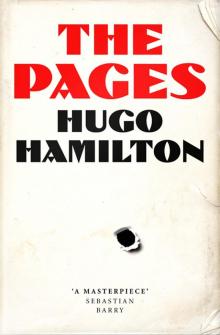 The Pages
The Pages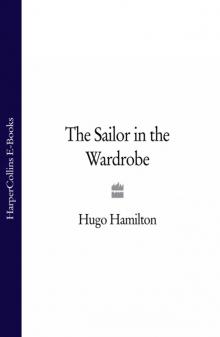 The Sailor in the Wardrobe
The Sailor in the Wardrobe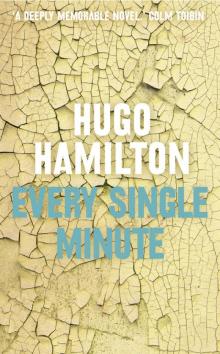 Every Single Minute
Every Single Minute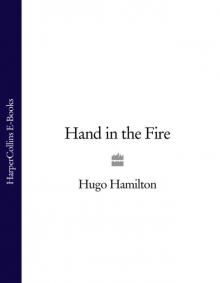 Hand in the Fire
Hand in the Fire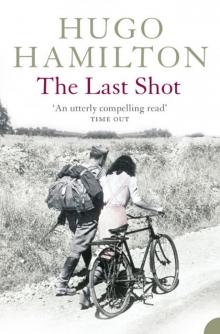 The Last Shot
The Last Shot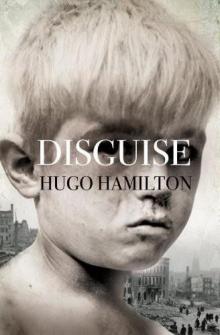 Disguise
Disguise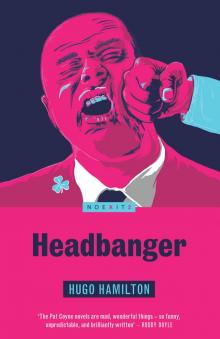 Headbanger
Headbanger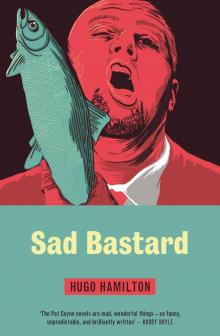 Sad Bastard
Sad Bastard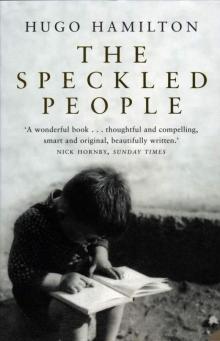 The Speckled People
The Speckled People